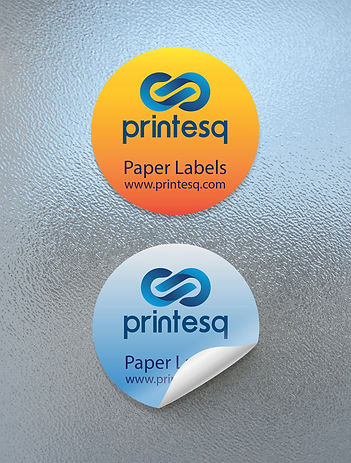Paper Materials
An Economical and Versatile Solution
Paper labels, crafted from diverse wood pulp materials, provide a cost-effective alternative to synthetic labels for a wide range of general applications. Their natural composition supports sustainability, offering recyclability and biodegradability.
What Printesq offers
Printesq provides a selection of roll paper label finishes to meet various aesthetic and functional needs, We at Printesq offer the following type of paper materials.
-
High-Gloss Paper
-
Semi-Gloss Paper
-
Matte Paper
Material
High-Gloss Paper
Delivers vibrant color reproduction and sharp text with a highly reflective, smooth surface.
Semi-Gloss Paper
Offers a balanced sheen, combining the visual appeal of gloss with the readability of matte paper.
Matte Paper
Provides a non-reflective, understated finish, ideal for a sophisticated, natural look.


Key Characteristics
Cost-Effectiveness
Paper labels are generally more economical than synthetic alternatives.
Printability
They offer excellent printability, accommodating various printing technologies.
Sustainability
Made from renewable resources, paper labels are recyclable and biodegradable.
Versatility
Suitable for diverse applications, from retail to food packaging on glass and plastic jars and containers and bottle labeling.
Applications
Paper labels find widespread use across numerous industries.
Retail
Ideal for product labeling where cost efficiency and visual appeal are crucial.
Food and Beverage
Preferred for labelling food and beverage products, especially when a natural aesthetic is desired.
Cosmetics and Personal Care
Used for enhancing product presentation with high-quality finishes.
Pharmaceuticals and Healthcare
Suitable for over-the-counter medications, ensuring clear and legible labeling.
Shipping and Logistics
Provides a practical and economical solution for packaging and identification.

Comparison with Synthetic Labels
While paper labels offer significant cost advantages, they lack the durability of synthetic labels.
Paper labels are susceptible to:
-
Moisture damage
-
Chemical exposure
-
Tearing and abrasion
-
Fading
Synthetic labels, conversely, offer superior resistance to these elements, making them suitable for harsh environments and long-term applications.
Conclusion
Paper labels are a versatile and economical labeling solution, ideal for applications where cost-effectiveness and aesthetic appeal are prioritized. However, for applications requiring exceptional durability and resistance to environmental factors, synthetic labels are the preferred choice.
Need help? Contact Printesq:
📞 Call: +1 818 653 0778
📧 Email: sales@printesq.com



